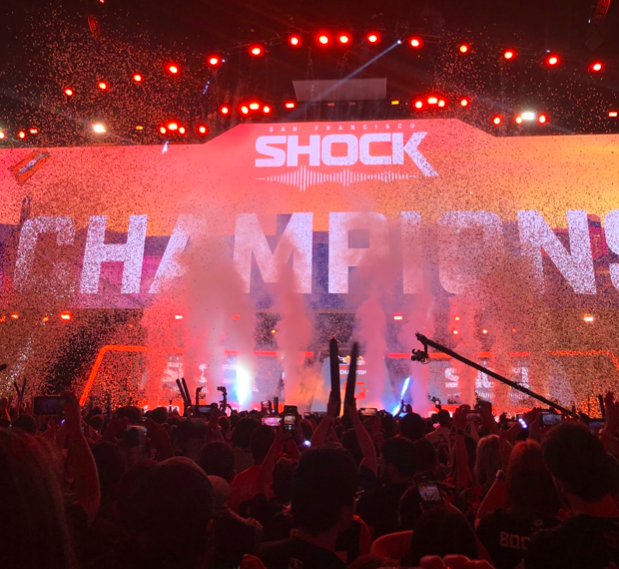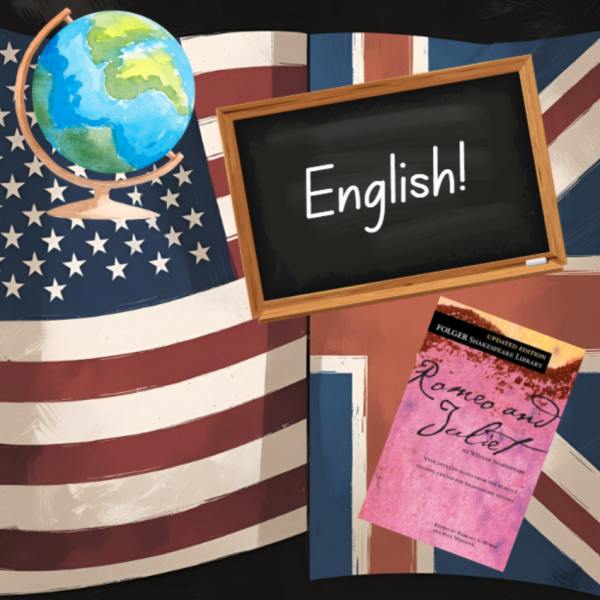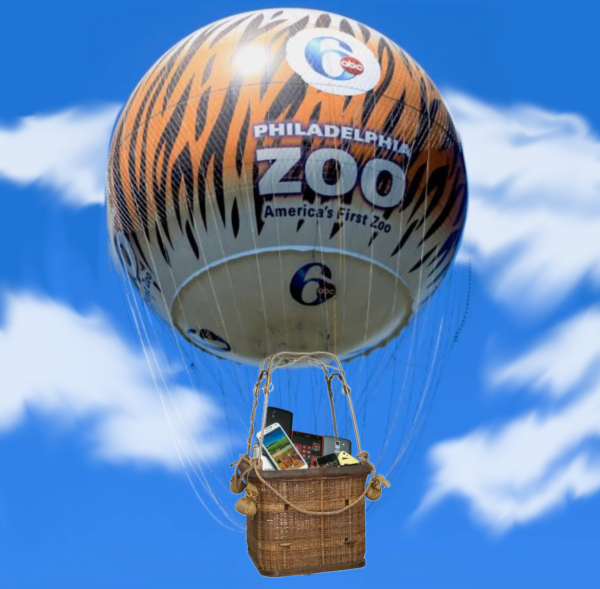Reflections on the 2019 Overwatch League Grand Finals in Philadelphia
November 12, 2019
Four hours before the two Overwatch League finalist teams were scheduled to face off in digital warfare, there was already a line snaking through Parking Lot E of the Wells Fargo Center. As soon as my friend Josh and I stepped onto the pavement, baking under an unseasonal September sun, we saw a group of four middle-aged Koreans posing for a photo on the parking lot sidewalk. Surprised to see people so much older than the target demographic, especially without a small child to begrudgingly supervise, we decided that we had to investigate. When we did, we noticed that they were carrying a banner the size of three sheets of printer paper. ‘SEO MINSOO Fighting! Grand Finals Victory,’ it said, featuring two photos of a stylish teenager wearing a gaming headset and blue jersey. We realized that this unusual bunch of Overwatch fans didn’t come here because of the convenient location like we did — they were the family of superstar e-athlete Seominsoo (pronounced SUH-min-soo), who was currently backstage in a twenty-thousand-seat sports arena warming up for the most important match of his career. All of my favorite teams had been eliminated several months ago, so I wasn’t planning on rooting for either team at the event, but after exchanging words of encouragement and Duolingo-level Korean with them, my allegiance for the day was with the Vancouver Titans — and their starting damage-dealer Seominsoo.
Once we were in line, Josh and I started to understand the sheer scope of the event that we were attending.
Fortunate enough to have upgraded to a very high ticket level–the Grandmaster Tier– Josh and I enjoyed numerous perks. These included an exclusive entrance to the arena, a meet-and-greet with a select group of OWL players, and ground-floor seating, among other things. While we stood on the asphalt, Josh and I met a fellow fan and avid player behind us, a year or two older than us, accompanied by his clueless but well-meaning older-brother-in-law. We made small talk about our favorite characters to play, our ingame rank in Competitive mode, and the upcoming match. He was holding a poster poking fun at Matthew “Super” DeLisi and the Titans’ star tank Sang-Beom “Bumper” Park, vocal rivals earlier in the year, for being moved to their respective teams’ benches during the playoffs. Apparently, someone printed a bunch of copies of this poster and he was the proud owner of one.
The inside of the arena reminded me of childhood trips to Phillies games at Citizens’ Bank Park. Trying to make my way through the crowd, surrounded at every turn by superfans in cosplay, overpriced concessions, lines of people behind stanchions, and alcohol, it was seemingly identical to an event for any other sport. Cosplayers were the only obvious tell that the crowd was here to watch video games instead.
We were inside the building by 12:45, but the actual match still wasn’t slated to start until 3:00; as Grandmaster ticket holders, we were able to pass some of the time by attending the player meet-and-greet. Unbeknownst to us, there were two separate groups of professional players for Grandmasters to meet–one group signing autographs and the other taking photos–and time wouldn’t allow one person to visit both. I lined up for the signing and Josh went off to take a picture. Our newfound friend and his brother-and-law from outside saved a spot for us in line, making a gracious gesture that saved some precious time. As I gradually approached the autograph table, someone on the other side of the hallway approached me and gave me a massive mousepad, telling me to get it signed for him. I already had multiple items to get signed, so I regretfully told him no. After finding a volunteer, the guy went down the rest of the line handing out stickers with his Twitch and YouTube usernames on them. Most ended up on the floor within minutes.
One might expect the autograph table to be a very lively place, with people losing their minds as they come face-to-face with their gaming idols. This was not the case; autographing seemed to be a relaxed and mundane affair. You gave them the item you wanted to be signed (popular choices: posters, Funko Pops still in the box, the aforementioned mousepad) and the player drew their signature while you greeted them. In hindsight, it makes sense that most gamers, being stereotypical introverts, wouldn’t enjoy making small talk.
With my signatures collected and Josh’s picture taken, it was now time to find our seats for the game itself. Grandmasters that we were, ours were at ground-level instead of the nosebleeds, right in front of the screen and at the epicenter of giveaways and interviews that would be happening during breaks.
Another fixture of OWL games borrowed from traditional sports is the preshow. In the half-hour or so before any match begins, there is a roundtable discussion of casters and analysts about players and strategies that they expect to be important in the upcoming game, sometimes mixed with pre-recorded video segments. The two finalists, the San Francisco Shock and the Vancouver Titans, both got their own hype videos, which were premiered at the preshow.
The Shock’s video features their roster–comprised of players from California, Sweden, Massachusetts, and South Korea–visiting Geno’s Steaks with teammate and Philadelphia native Matthew “Super” DeLisi as he explains the city’s culture. DeLisi stands at the head of the table as his teammates eat, part tour guide and part comedian. “In Philly, sports fans are like a bunch of rabid animals,” he explained. “they care a lot.” The ten-man roster walks together through an Italian market in South Philly before sitting down in front of a heavily-graffitied brick wall to discuss their gameday mentality. DeLisi and season MVP Jay “Sinatraa” Won reveal that confidence is the secret: they never go into a game expecting their opponents to be better than them.
The Titans’ pregame video chose instead to juxtapose the team with Rocky, showing the all-Korean squad running up the Art Museum steps and shadowboxing. The Titans seem as confident as their opponent, with season MVP candidates Hyeon-Woo “Jjanu” Choi and Ju-Seok “Twilight” Lee expressing pride in their team’s ability to adapt on the fly and utilize the most powerful characters in the current version of the game. Sitting on the stairs with the Grand Finals trophy between them, most of the team nonetheless expresses reverence for the prestigious title they are about to fight for, Fan-favorite damage player Hyo-Jong “Haksal” Kim (‘haksal’ meaning ‘massacre’ in Korean) is the only one who dares trash talk instead, saying in Korean that he plans to “put an end” to the Shock and Titans’ year-long rivalry.
The comparison to Rocky was no accident; for many fans, Vancouver fits squarely into a long ‘underdog’ storyline. Before the Overwatch League existed, a unique team named RunAway existed in the competitive Korean Overwatch scene. In 2017, after falling from a breakout 2nd place performance to a first-round elimination in the famous Overwatch APEX tournament series, RunAway was prepared to disband entirely until fans rallied together, giving them the confidence and funding to achieve another 2nd place finish. Once the second season of the Overwatch League began in February of this year, the RunAway roster, still containing some of the players from their original APEX runs, was signed as an 8-man squad to the League and christened the Vancouver Titans. Indeed, I saw multiple pink RunAway sweaters — the team’s classic uniform, which used to be used in lieu of the typical nylon jersey — at the Finals, marking dedicated fans of the team.
The Shock, on the other hand, have followed a more contemporary Philadelphian sports story. In 2013, the Philadelphia 76ers moved to completely rebuild the franchise’s team culture and roster under a doctrine known simply as “The Process.” After a few more years of disappointment, the Sixers’ ‘tanking’ strategy finally bore fruit in the 2017-2018 season, where they rapidly became one of the best teams in the league and rewarded the trust of their diehard fans. While the Overwatch League has only just completed the second season, the Shock’s progression has taken after that of the Sixers, focusing on signings with long-term potential like talented but nervous rookie Jay “Sinatraa” Won and prolific coach Dae-Hee “Crusty” Park. Sure enough, even though the Shock failed to qualify for the 2018 playoffs, analysts expected the OWL’s “first intentional tank” to see success in 2019 — and, needless to say, they were right.
As Josh and I found our seats, the sheer size of the event became overwhelming. Every time I tell uninitiated friends and relatives about attending the Grand Finals, I mention that the event was sold out in an attempt to validate esports to them. Actually seeing what ‘sold out’ looks like in person, — rows upon rows of eager fans stretching to the ceiling, fanatically waving posters — is something else. The crowd seemed even bigger when the LED bracelets they gave out at the door started glowing, creating a mosaic of orange whenever San Francisco won a map.
The cheers of the crowd were deafening when players from Vancouver or San Francisco did something impressive, but the cheers were a little bit louder for plays made by the Shock. Having one Philadelphian on the team (the team’s bench, no less) was enough to win the crowd’s favor. Fortunately for them, the Shock seemed to be at no risk of losing. Still cheering for Min-soo “Seominsoo” Seo, I started to cringe every time one of Vancouver’s players got killed. Once Vancouver was down 0-2 in maps (first team to win four maps gets the trophy), I started shouting advice at the screen like they could hear me. Before my very eyes, I had morphed into my least favorite person at Radnor football games: the guy at the top of the Prevost Field bleachers yelling ‘GET THE BALL’ at the players.
Once Min-ho “Architect” Park gatling-gunned the last Vancouver Titans at the end of the fourth map, the arena erupted in cheers once more. Ten smoke-machine pillars jetted into the air, creamsicle-colored confetti rained down from the ceiling, and orange spotlights turned onto the stage. All of the Shock’s staff and benched players ran out of the ‘dugout’ and onto the stage, hugging and cheering each other in disbelief. After a Little League procession of exchanging handshakes and the words ‘good game’ with the Titans, the entire Shock roster hoisted the Grand Finals trophy in unison.
For the crowd, it didn’t matter that native Philadelphian Matthew “Super” DeLisi was warming the bench for all four maps. In esports, as in real sports, the storyline is all that matters — and the story is more fun than real life.







